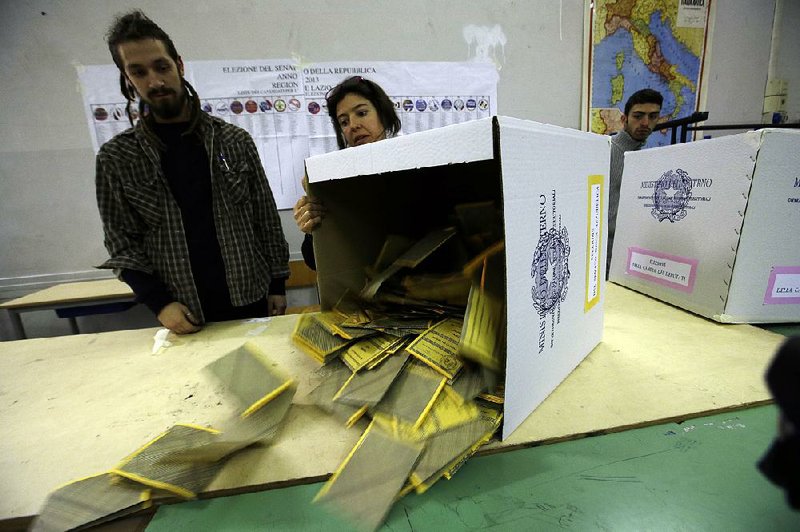ROME — Italy faced political paralysis Monday as near-complete results in crucial national elections showed no clear winner and raised the possibility of a hung parliament. The uncertainty bodes ill for the nation’s efforts to pass the tough changes it needs to snuff out its economic crisis and prevent a new round of global financial turmoil.
A major factor in the murky result was the astonishing vote haul of comic turned-political leader Beppe Grillo, whose 5 Star Movement has capitalized on a wave of voter disgust with the ruling political class.
That has coupled with the surprise return as a political force of billionaire media mogul Silvio Berlusconi, who was driven from the premiership at the end of 2011, to roil the Italian ballot.
Berlusconi’s alliance was neck-and-neck with center-left leader Pier Luigi Bersani’s coalition for both Parliament’s lower house and the Senate.
The ballot was so close that final official results were not expected until today.
The decisions Italy’s government makes over the next several months promise to have a strong effect on whether Europe can decisively stem its financial crisis.
As the eurozone’s third largest economy, its problems can rattle market confidence in the whole bloc and analysts have worried it could fall back into old spending habits.
The unfolding uncertainty raised the possibility of new elections in the coming months, the worst possible outcome for markets that are looking to Italy to stay the course with painful but necessary reform.
The Italian election has been one of the most fluid in the past two decades thanks to the emergence of Grillo’s 5 Star Movement, which has throbbed with anger at politics as usual. The movement came against a backdrop of harsh austerity measures imposed by technocrat Premier Mario Monti - who has fared miserably in the elections.
While Grillo trailed the alliances of the two biggest mainstream forces, his movement looked set to become the biggest single party in Parliament’s lower house.
Many eligible voters didn’t cast ballots, and a low turnout is generally seen as penalizing established parties.
The turnout, at under 75 percent - in a nation where it has historically been above 80 percent - was the lowest in national elections since the republic was formed after World War II.
Disgust with traditional party politics likely turned off voters, although snow and rain - this was Italy’s first wintertime national vote - also could be a factor.
Bersani, a former communist, was the architect of a series of liberalization measures and has shown a willingness to join with Monti, if necessary.
His party would have to win both houses to form a stable government.
Grillo’s camp also played down the prospect of cooperation with the ex-premier, who has been embroiled in sex and corruption scandals.
With 99.7 percent of the lower house vote counted, the Bersani camp had had 29.55 percent of the vote, to Berlusconi’s 29.17 percent. Grillo had 25.54 and Monti’s alliance 10.56.
In the Senate, near complete Interior Ministry figures showed Bersani and his allies had nearly 32 percent while Berlusconi and his coalition partners were pulling nearly 31 percent. Grillo had more than 23 percent.
More important than the overall national numbers, however, was the state-of play in large swing regions - and Berlusconi was projected to win those.
Italy’s complex electoral law calls for the Senate seats to be divvied up according to how candidates fare region by region, and Berlusconi appeared to be winning big in Lombardy, and also ahead in the closely watched regions of Sicily and Campania, around Naples.
A Berlusconi triumph in those key regions would likely hand him control of the upper chamber, which in Italy’s legislative system is as powerful as the lower house.
Berlusconi has promised to give back an unpopular property tax imposed by Monti - with money from his own deep pockets, if need be.
With near complete results, Bersani had a tiny edge in the lower chamber, where electoral law enables the biggest vote-getter there to end up with a bonus of more than 50 percent of the seats.
Monti’s centrist coalition was having a terrible election, with his alliance getting roughly 10 percent. Although respected abroad for his measures that helped stave off Italy’s debt crisis, the economist has widely been blamed for financial suffering caused by austerity cuts.
Front Section, Pages 2 on 02/26/2013
